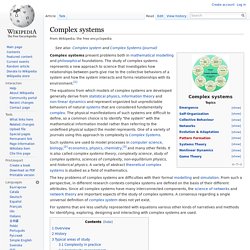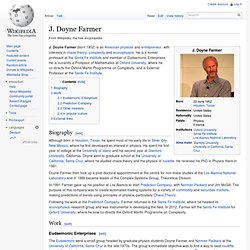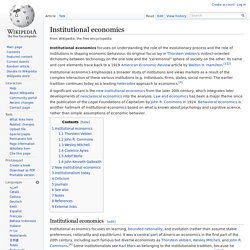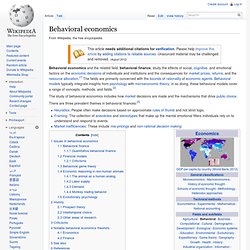

Got Links Shop. "Got Links Shop: General Directory, Free And Paid Listings" UPnPGrid facilite le partage de fichiers en réseau étendu. La plate-forme propose d'échanger des ressources multimédias entre plusieurs habitations sans passer par un site de distribution public. Il suffit d'utiliser le même fournisseur d'accès, et d'être connectés au même moment. Pour faciliter le partage de fichiers multimédias à distance, l'école polytechnique de Madrid travaille sur un dispositif en réseau qui permet d'échanger et consulter du contenu sans avoir à se rendre sur les sites sur lesquels ils ont été trouvés.
Baptisé UPnPGrid, il repose sur le protocole UPnP (Universal Plug and Play), qui permet à des périphériques d'être interconnectés via un réseau local. Mais il y apporte des extensions. La première : faire que le protocole fonctionne en mode WAN, c'est-à-dire en réseau étendu. Comment simuler le monde ? - Blogs InternetActu.net. Il est courant aujourd’hui de penser que dans le domaine des systèmes complexes, la prévision est un exercice impossible.

Triste constat de défaite, car la plupart des problèmes qui se posent aujourd’hui (économie, écologie, mentalités) entrent dans cette catégorie. Aussi est-il intéressant de constater que certains chercheurs (qui, loin d’ignorer les lois de la complexité, travaillent dans ce domaine) n’ont pas baissé les bras et tentent de trouver les moyens de prédire ces systèmes, voire d’agir sur eux. Ainsi, nous explique la BBC, certains cherchent aujourd’hui à créer un “simulateur de monde” (baptisé le Life Earth Simulator, ou LES) combinant l’ensemble des données transports, économie, émigration, environnement, santé, etc. Le LES n’est d’ailleurs qu’une partie du gigantesque projet européen mené par l’Institut de technologie de Zurich, FuturICT qui se définit comme un “accélérateur de connaissance”, équivalent social d’un “accélérateur de particules” comme le LHC en physique. Complexity economics. What should policymakers know about it.
Home. Complex systems. Complex systems present problems both in mathematical modelling and philosophical foundations.

The study of complex systems represents a new approach to science that investigates how relationships between parts give rise to the collective behaviors of a system and how the system interacts and forms relationships with its environment.[1] Complex adaptive system. They are complex in that they are dynamic networks of interactions, and their relationships are not aggregations of the individual static entities.

They are adaptive in that the individual and collective behavior mutate and self-organize corresponding to the change-initiating micro-event or collection of events.[1][2] Overview[edit] The term complex adaptive systems, or complexity science, is often used to describe the loosely organized academic field that has grown up around the study of such systems. Complexity science is not a single theory— it encompasses more than one theoretical framework and is highly interdisciplinary, seeking the answers to some fundamental questions about living, adaptable, changeable systems.
Systemtheorie. Die Systemtheorie ist sowohl eine allgemeine und eigenständige Disziplin als auch ein weitverzweigter und heterogener Rahmen für einen interdisziplinären Diskurs, der den Begriff System als Grundkonzept führt.

Es gibt folglich sowohl eine allgemeine „Systemtheorie“ als auch eine Vielzahl unterschiedlicher, zum Teil widersprüchlicher und konkurrierender Systemdefinitionen und -begriffe. Es hat sich heute jedoch eine relativ stabile Reihe an Begriffen und Theoremen herausgebildet, auf die sich der systemtheoretische Diskurs bezieht. The origin of wealth: evolution ... - Google Bücher. Company - The Origin of Wealth: Evolution, Complexity, and the R. Company — German Office - Gleichgewicht, Wohlstand und Evolution. Weekend columnists / Tim Harford - Why getting complicated incre. J. Doyne Farmer. J.

Doyne Farmer (born 1952) is an American physicist and entrepreneur, with interests in chaos theory, complexity and econophysics. He is a former professor at the Santa Fe Institute and member of Eudaemonic Enterprises. He is currently a Professor of Mathematics at Oxford University, where he co-directs the Oxford Martin Programme on Complexity, and is External Professor at the Santa Fe Institute. Samuel Bowles (economist) Samuel Stebbins Bowles (/boʊlz/; born 1939) is an American economist and Professor Emeritus at the University of Massachusetts Amherst, where he continues to teach courses on microeconomics and the theory of institutions.[1] His work belongs to the Neo-Marxian[2][3][4] (variably called Post-Marxian)[5][6][7] tradition of economic thought; however, his perspective on economics is eclectic and draws on various schools of thought, including what he (and others) refer to as post-Walrasian economics.[8] Bowles, the son of US Ambassador and Connecticut Governor Chester Bowles,[9] graduated with a B.A. from Yale University in 1960, where he was a founding member of the Yale Russian Chorus, participating in their early tours of the Soviet Union.

Subsequently, he received his PhD in Economics from Harvard University in 1965 with thesis titled The Efficient Allocation of Resources in Education: A Planning Model with Applications to Northern Nigeria. The Berkeley group studied four questions: Austrian School. The Austrian School is a school of economic thought that is based on methodological individualism.[1][2][3][4] It originated in late-19th and early-20th century Vienna with the work of Carl Menger, Eugen von Böhm-Bawerk, Friedrich von Wieser, and others.[5] Current-day economists working in this tradition are located in many different countries, but their work is referred to as Austrian economics.

Among the theoretical contributions of the early years of the Austrian School are the subjective theory of value, marginalism in price theory, and the formulation of the economic calculation problem, each of which has become an accepted part of mainstream economics.[6] Institutional economics. Institutional economics focuses on understanding the role of the evolutionary process and the role of institutions in shaping economic behaviour.

Its original focus lay in Thorstein Veblen's instinct-oriented dichotomy between technology on the one side and the "ceremonial" sphere of society on the other. Its name and core elements trace back to a 1919 American Economic Review article by Walton H. Evolutionary economics. Behavioral economics. There are three prevalent themes in behavioral finances:[3] Issues in behavioral economics[edit] Behavioral finance[edit] The central issue in behavioral finance is explaining why market participants make systematic errors contrary to assumption of rational market participants.[1] Such errors affect prices and returns, creating market inefficiencies.

Behavioural Economics. Recherche Systèmes complexes. Complexity and Information. Collapse-dynamics. Evolutionary Economics. #Finance Complex Adaptive System. The Complexity Vision and the Teaching of Economics…